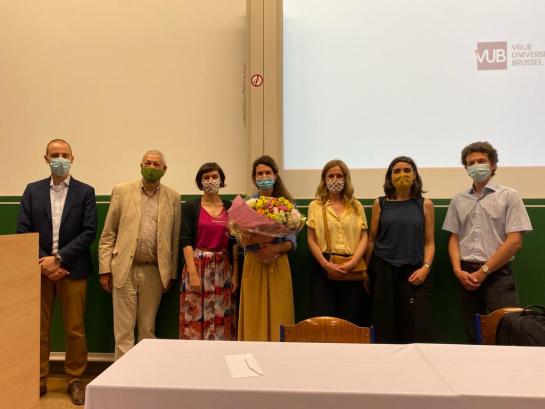
Political indignation: a conceptual and empirical investigation of indignant citizens (Belgium 2017-2020)
A short interview with the author
On 18 June 2021, Louise Knops defended her thesis on contemporary expressions of citizens' indignation in the Belgian landscape. Louise has a Masters Degree in European Studies and held previous positions in academia (Centre for European Policy Studies) and in EU institutions (European Parliament, parliamentary assistant). Currently, her research interests cover digital democracy, social movements, populism, political representation.
Can you summarize your thesis in a few words?
The starting point of the thesis is the so-called 'crisis of political representation'; the fact that increasing numbers of citizens feel completely disconnected from political representatives. The aim of the thesis was to try to provide a fresh outlook on this well-documented phenomenon and to make sense of the many different forms in which citizens express their political contestation; be it the anger of younger generations for the political inaction on climate change, the feelings of abandonment shared by many citizens but also the mounting contestation coming from the radical-right side of the political spectrum. To do this, the thesis develops the concept of 'political indignation' as heuristic tool to make sense of the difference faces of today's crisis of representation, situated in the broader context of political betrayal and ecological collapse.
If you want more information about Louise's thesis, you can find the full abstract here and watch the video from her public defense below.
What is the main academic or societal contribution of your thesis?
The thesis tries to make a two-fold contribution. First, at the conceptual level, by unpacking the different facets and dimensions of indignation, the thesis contributes to the current re-appraisal of affects and emotions in the field of political science, and studies of political representation and mobilization more specifically. Second, at the empirical level, the thesis provides evidence on the indignation of four substantially different groups of citizens which have emerged in recent years in the Belgian landscape, and which are seldom studied jointly, namely: the Citizen Platform for Refugee Support, the Youth for Climate movement, the Yellow Vests, and the radical-right movement Schild & Vrienden. Overall, the dissertation provides a rare insight into opposing contentious movements and provides new empirical evidence on our current age of hate, disdain and outrage against politics and political elites of all kinds.
Could you share with us an anecdote related to your PhD-experience?
There are many happy and funny anecdotes to share. The PhD journey has been, for me, a life-changing and wonderful experience. But I'd like to share an anecdote that also illustrates the low points and the human face of completing a PhD - in particular during the peak of the covid-crisis. It must have been April 2020, we were deep in confinement number 1. I had luckily completed most of my data collection, but there was one last person I really wanted to speak to. After months of waiting, she finally responded and gave me a call that day. But my children, at the time aged 3 and 4, were there, and they were making a lot of noise. So much noise that I could barely hear her, let alone focus on the important things she was saying. I ended up having to hide in the toilet to have a bit of quiet and make sure the kids wouldn't barge in in the middle of the interview!
Follow Louise on Twitter: @louise_knops
